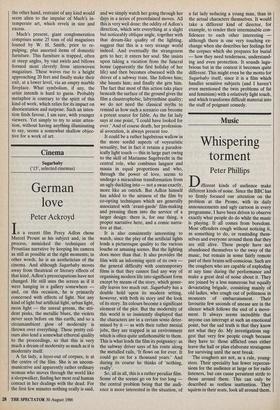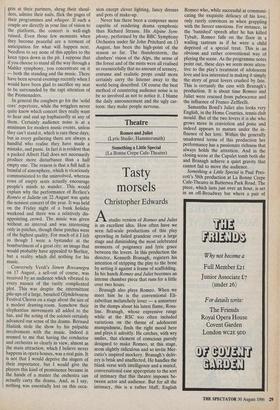Music
Whispering torment
Peter Phillips
Different kinds of audience make different kinds of noise. Since the BBC has so firmly focused our attention on the problem at the Proms, with its daily announcements and ugly cartoon in every programme, I have been driven to observe exactly what people do do while the music is playing. It all comes from boredom. Most offenders cough without noticing it, as something to do, or reminding them- selves and everyone around them that they are still alive. These people have not abandoned themselves to the sway of the music, but remain in some fairly remote part of their brains self-conscious. Such are the coughers who are capable of exploding at any time during the performance and make a great deal of noise about it. They are joined by a less numerous but equally devastating brigade, consisting mainly of old ladies, who cough out of politeness in moments of embarrassment. Their favourite few seconds of unease are in the silence which follows the end of a move- ment. It always seems incredible that anyone can interrupt at such an emotional point, but the sad truth is that they know not what they do. My investigations sug- gest that very few people cough because they have to: those afflicted ones either leave the hall or plan elaborate stratagems for surviving until the next break.
The coughers are not, as a rule, young- sters. Their speciality has fewer repercus- sions for the audience at large or for radio listeners, but can cause persistent strife to those around them. This can only be described as restless inattention. They squirm in their seats, look all around them, grin at their partners, shrug their shoul- ders, admire their nails, flick the pages of their programmes and whisper. If such a couple are directly in your line of vision to the platform, the concert is well-nigh ruined. Even those few moments when they become peaceful are a torment of anticipation for what will happen next. Needless to say none of this applies to the keen types down in the pit. I suppose that if you choose to stand all the way through a Mahler symphony, you concentrate on it — both the standing and the music. There have been several evenings recently when I would have been glad to sacrifice my seat to be surrounded by the rapt attention of the Promenaders.
In general the coughers go for the 'solid core' repertoire, while the wrigglers never quite know which concert they really want to hear and end up haphazardly at any of them. Certainly audience noise is at a minimum for modern music events, unless they can't stand it, which is rare these days; but in every gathering there are always a handful who realise they have made a mistake, and panic. In fact it is evident that a packed Albert Hall does not necessarily produce more disturbance than a half empty one. The reason is that a full hall is brimful of atmosphere, which is vicariously communicated to the uninvolved, whereas rows of empty seats actually encourage people's minds to wander. This would explain why the performance of Berlioz's Romeo et Juliette on 22 August was quite the noisiest concert of the year. It was held on the Friday night of a bank holiday weekend and there was a relatively dis- appointing crowd. The music was given without an interval and was interesting only in patches, though these patches were of the highest quality. For much of it I felt as though I were a bystander at the bombardment of a great city: an image that would probably have appealed to Berlioz, but a reality which did nothing for his music.
Conversely Verdi's Simon Boccanegra on 17 August, a sell-out of course, was received by an audience which vibrated to every nuance of the vastly complicated plot. This was despite the intermittent pile-ups of a large, besuited Glyndebourne Festival Chorus on a stage about the size of a modest drawing-room. Somehow their elephantine movements all added to the fun, and the acting of the soloists certainly advanced our sense of the drama. Bernard Haitink stole the show by his palpable involvement with the music. Indeed it seemed to me that having the conductor and orchestra so clearly in view, almost as the main attraction, which I believe never happens in opera houses, was a real gain. It is not that I would deprive the singers of their importance, but I would give the players this kind of prominence because in the hands of a master the orchestra can actually carry the drama. And, as I say, nothing was essentially lost on this occa- sion except clever lighting, fancy dresses and pots of make-up.
Never has there been a composer more capable of rendering drama symphonic than Richard Strauss. His Alpine Sym- phony, performed by the BBC Symphony Orchestra under Sir John Pritchard on 13 August, has been the high-point of the season so far. The thunderstorm, the climbers' vision of the Alps, the sense of the forest and of the mists were all realised so resourcefully that no amount of scenery, costume and realistic props could more certainly carry the listener away to the world being described. Of course the best method of countering audience noise is to be so involved as not to notice it. I blame the daily announcement and the ugly car- toon: they make people nervous.









































 Previous page
Previous page